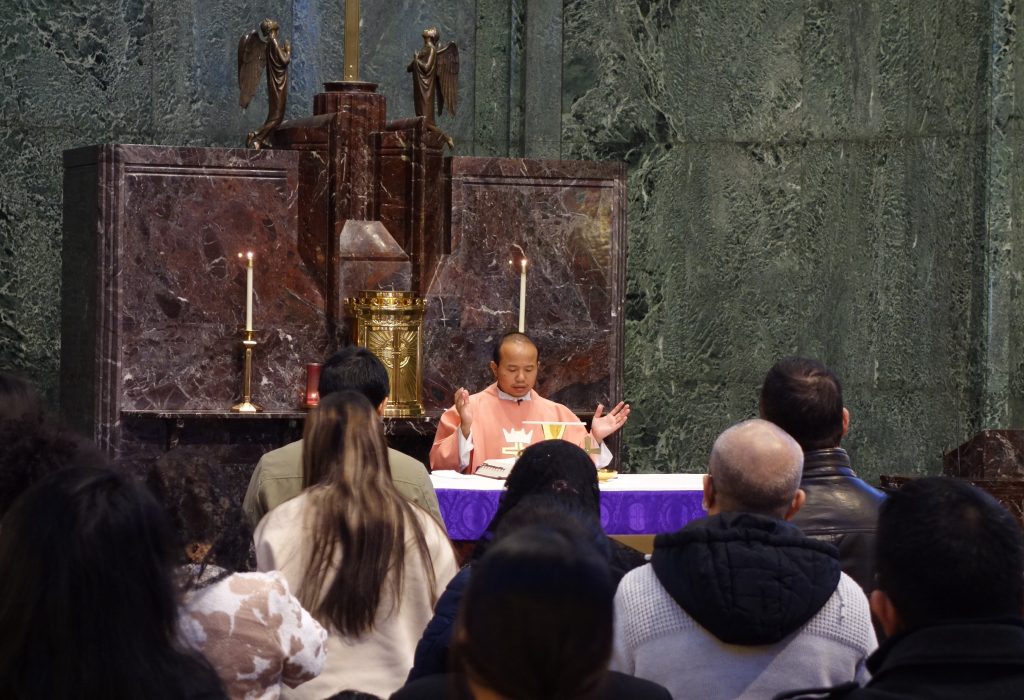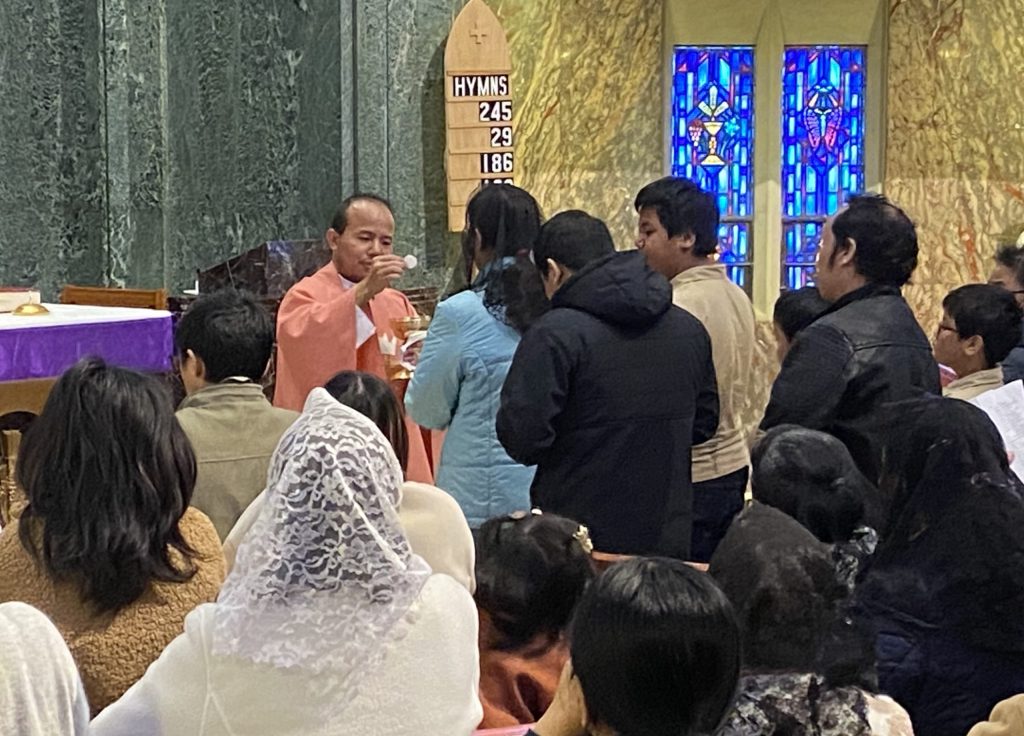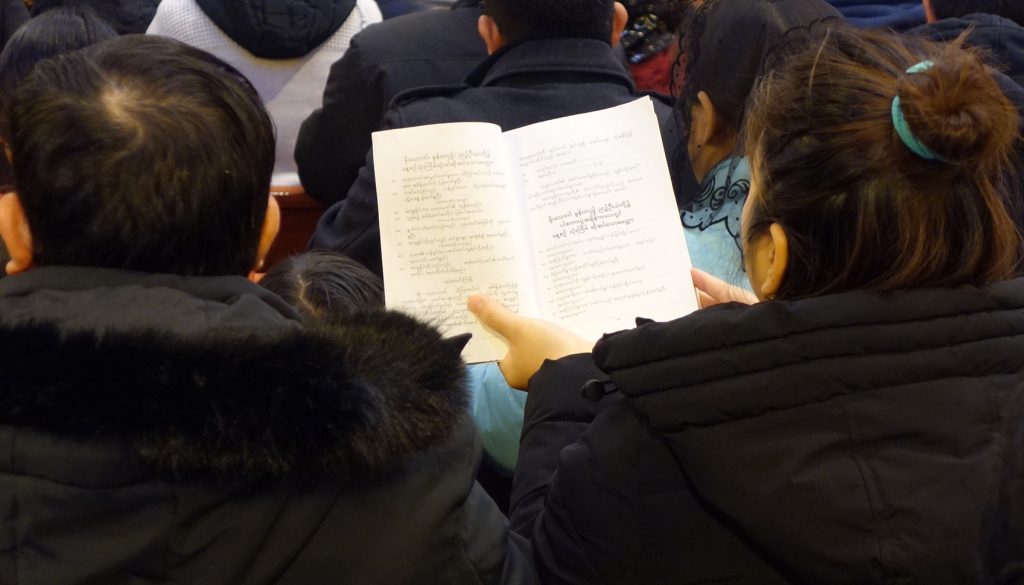March 19, 2024 // Diocese
A Ministry of Service
Father Peter Dee De Plays an Important Role in the Spiritual, Cultural Lives of Fort Wayne’s Burmese Catholic Community
In 2015, a fellow priest asked Father Peter Dee De what his job involved while ministering to Catholics from Burma now living in the Diocese of Fort Wayne-South Bend. Father Dee De replied, “Driver, interpreter, caseworker, and part-time priest.”
He still performs many of those duties, but his role has evolved during the last several years.
“I can fully be involved in pastoral ministry,” said Father Dee De, who began his work in the diocese in 2012. “It was more on the social concerns in the past. But now, it’s more on the spiritual.”
Some of that pastoral care was evident during the Mass he celebrated on Sunday, March 10, for the Fort Wayne-area Burmese Catholic community. Father Dee De encouraged people, as they continue their Lenten journey toward Easter, to consider what they have learned thus far in Lent, how have they changed, and how they can grow during the remaining days of Lent.

Father Peter Dee De tries to celebrate Mass in the Burmese language twice a month for the approximately 200 Burmese Catholics in Fort Wayne. The Masses take place at the St. Mother Theodore Guerin Chapel on Cathedral Square in downtown Fort Wayne. Father Dee De also serves Burmese Catholic congregations in Grand Rapids, Michigan, and Wheaton, Illinois.
Around 150 people attended the Mass in St. Mother Theodore Guerin Chapel on the downtown campus of the Cathedral of the Immaculate Conception. The Mass was celebrated in Burmese, a general language that people from the country now known as Myanmar can use to communicate despite coming from many different cultural groups that speak their own dialects.
The first Burmese refugees began arriving in Fort Wayne in 1991. Many came from camps in the jungle on the Burma-Thailand border where pro-democracy advocates had fled after the country’s military rulers began a brutal crackdown on dissent in the late 1980s. Those rulers later renamed the country as Myanmar.

Kevin Kilbane
Father Peter Dee De distributes Communion during a Mass for Burmese Catholics at St. Mother Theodore Guerin Chapel in downtown Fort Wayne on Sunday, March 10. Father Dee De came from the Diocese of Loikaw in Burma, now called Myanmar, in 2012 to help the Diocese of Fort Wayne-South Bend serve Catholics among the Burmese refugees who have settled in Fort Wayne.
Through the refugee resettlement work of Catholic Charities of the Diocese of Fort Wayne-South Bend and other individuals and organizations in Fort Wayne, the city became home to several thousand Burmese people, creating one of the larger Burmese refugee communities in the United States. In addition to Catholicism, people in the Fort Wayne Burmese community practice faiths including other denominations of Christianity, Buddhism, and Islam.
Father Dee De said his home diocese, the Diocese of Loikaw in southeast Burma, initially was contacted by the late Bishop John M. D’Arcy of Fort Wayne-South Bend about providing a priest to serve Burmese Catholics who had resettled in Fort Wayne. Bishop Rhoades later succeeded Bishop D’Arcy and issued the invitation that brought Father Dee De to Fort Wayne.
Father Dee De had been ministering to Catholics at a jungle parish when his bishop directed him to go help Burmese Catholics in this diocese and the central United States. About 2 percent of people in Myanmar, or about 1 million people, are Catholic, Father Dee De said. Most adult Burmese Catholics in America joined the faith in Burma.
Father Dee De currently ministers to about 50 Catholic households, including about 200 people in the Fort Wayne area, he said. He serves a similar number of households in Grand Rapids, Michigan, and a larger group of Burmese Catholics in Wheaton, Illinois, a suburb on the west side of Chicago.
In addition, Father Dee De occasionally travels to minister to Burmese Catholics in Texas, where he worked more frequently early in his ministry here.
Father Dee De said he tries to meet the needs of people in the Burmese community whether they are Catholics or non-Catholics. “We’re not after numbers,” he explained. “We have to help everyone. … I’m glad I can do that because we are Catholics.”

Photos by Kevin Kilbane
Members of the Burmese Catholic community in Fort Wayne use a hymnal printed in Burmese during the Burmese-language Mass that Father Peter Dee De celebrates twice a month at St. Mother Theodore Guerin Chapel on the campus of the Cathedral of the Immaculate Conception in downtown Fort Wayne. About 150 Burmese Catholics attended the Mass at the chapel on Sunday, March 10.
In the early years, his ministry often involved assisting people with basic needs, such as food and shelter. He also assisted people with applying for government food assistance and Medicaid, as well as paperwork to seek asylum in the United States.
These days, Father Dee De said he can refer many people to college graduates in the local Burmese community who can help them with those matters. More nonprofit organizations, such as Catholic Charities and Amani Family Services, also have stepped up to assist Burmese refugees with basic needs and when they need an interpreter. He can focus more time on assisting people spiritually by providing the liturgy and the sacraments.
He normally celebrates Mass for Burmese Catholics at 11:30 a.m. twice a month in the Mother Guerin Chapel.
“We try to be inclusive and make every Burmese-speaking people feel welcome,” Father Dee De said of using the Burmese language during Mass.
The dates for the Masses can vary from month to month, depending on whether he needs to be at one of the other Burmese Catholic communities he serves.
He offers the Sacrament of Reconciliation before the local Burmese Masses and presides at marriages and funerals for the Burmese Catholics he serves. During Lent, congregation member Anthony Thang also leads Stations of the Cross prayers at 7 p.m. on Fridays in Mother Guerin Chapel.
Around 80 percent of the Burmese Catholic community’s elementary-age children attend local Catholic schools, and about 10 students attend Bishop Dwenger High School, Father Dee De said. Indiana’s School Choice voucher program has been a key factor in making that possible, he added.
People in the Burmese Catholic community appreciate being able to celebrate Mass together, said Pau Sang, the congregation’s youth leader. Father Dee De also remains one of the first people many in the congregation call for help with filling out various paperwork or with other needs, Sang said.
Father Dee De faces some challenges, though. Many people in the congregation speak the Zo dialect and would like to celebrate Mass in that language, Sang and Thang said. Father Dee De speaks the Karenni dialect, however, so he communicates with congregation members in the more general Burmese language or in English.
Father Dee De also sees a need to provide more mental health care or counseling for people.
He said it’s sometimes difficult to assess what impact his ministry has in the Burmese community because results aren’t always imminent. He works to meet whatever needs arise.
“I’m trying my best to be of service,” he said.
HOW TO HELP
The Burmese Catholic community in the Diocese of Fort Wayne-South Bend has been collecting donations to provide food and other assistance to Catholics in Burma, now known as Myanmar.
Father Peter Dee De’s home diocese, the Diocese of Loikaw, is located in Kayah State in the southeast part of the country. As of November, more than 80% of Kayah State citizens had been displaced by fighting between the ruling military junta and opposition groups, the diocese recently notified him. In late November, the military fired artillery shells at the diocese’s cathedral and offices before moving to take control of the compound. The bishop and priests there had to flee to a parish set up in the jungle along the border with Thailand.
If you would like to assist Catholics from the Diocese of Loikaw, send a check payable to The Diocese of LoiKaw to Bishop’s House, Naung Yah, Loikaw 09011, Kayah State, Myanmar.
The best news. Delivered to your inbox.
Subscribe to our mailing list today.






